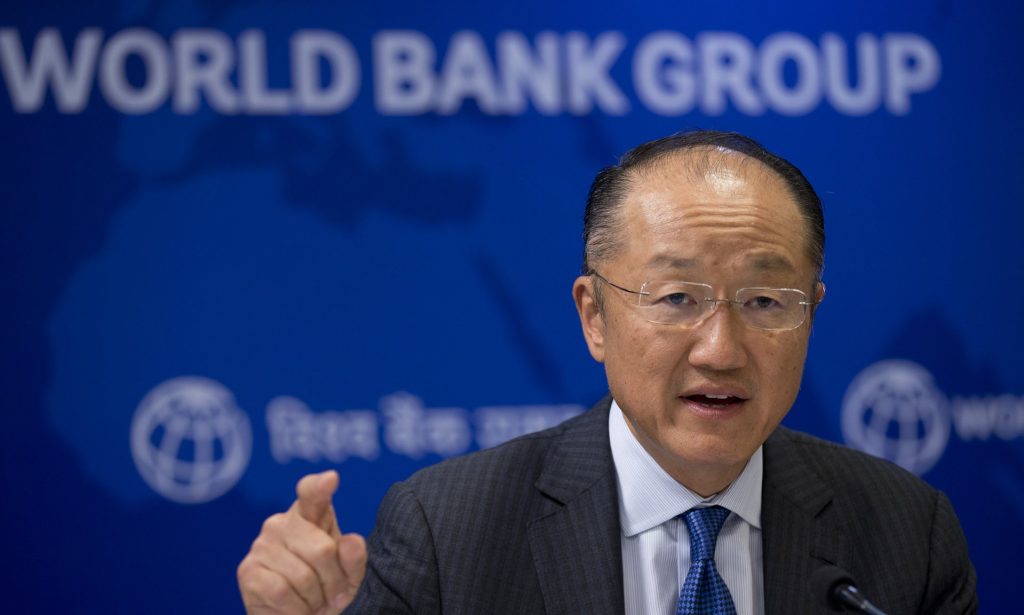
Photograph: Saurabh Das/AP
The catastrophic Ebola outbreak in west Africa could have been snuffed out as early as the summer of 2014 had sufficient money been available, according to Jim Yong Kim, the World Bank president.
Instead, the number of cases increased tenfold in three months. Although the bank made emergency funds available in August 2014, most of the donations from other major donors did not kick in until October of that year. By the end of October 2014, there had already been more than 13,500 cases and nearly 5,000 deaths (pdf).
In an interview with the Guardian, Kim said there need never again be such a delay following the launch of a pandemic financing facility, backed by insurance companies, that will ensure million of dollars are instantly released to fight similar disease outbreaks in the future.
A cash window of $100m (£75m) will disperse emergency funds in the event of certain types of disease outbreak, including Sars and flu as well as Ebola and similar viruses. Had the facility been in place earlier, it could have been utilised when significant numbers of Ebola cases were first reported.
“The $100m would have released in July and I think we would have been able to have a much better chance of getting in control of it in July. October is when it got really bad,” said Kim.
The cash window funded by donors is a first stage, designed to give rapid access to emergency funds. The mechanism could have been triggered by the Zika outbreak in Brazil had it been available.
The second stage is an insurance policy while the third is a bond, worth in total up to $500m. Unlike the normal claims-based insurance policies, where people are reimbursed afterwards, this is parametric insurance, which releases money the moment things begin to happen. How much is released depends on the size, spread and severity of the outbreak.
“What was difficult was getting agreement on what those triggers were going to be. So we had infectious disease specialists, and the World Health Organisation was in the middle of all this, and we had a modelling group, and we sat down and we said, ‘When would it have triggered, for example, for Ebola? When would it trigger for flu? When would it trigger for the Sars type viruses?’ Amazingly, we came to an agreement and the insurance companies, which were working with us all along, said, ‘OK, we agree,’” said Kim.
Kim added that they needed to work out how the money would be spent once available. He credits Ertharin Cousin, head of the World Food Programme, for introducing a network of deals and logistical arrangements that would enable a much faster response.
“When people think about WFP they think about supporting food systems,” said Cousin. “Among the tools and capacities we’ve developed as a result of addressing food systems are logistics, supply chain management, procurement, storage, warehousing – all of those things that you are required to do in order to meet food needs.”
Those capacities are now utilised in a wide range of humanitarian activities, she said, adding that during the Ebola crisis they went even further, supporting the building of emergency centres and bringing in equipment “to get us to the last person at the last mile”.
In the wake of the Ebola pandemic, Cousin convened meetings of many players – private companies that sell medical supplies, carriers, UN organisations – to work out how they could be ready. By this December, she says, a governance structure will be in place “that will support global pandemic preparedness by creating a public/private supply chain”.
WFP now has a list of 60 top items that will be needed in a pandemic, from rubber gloves and face masks to needles and sterilisation equipment. They know where they can be sourced and how they can be shipped at any time, and the details are on a World Health Organisation website, which will be updated constantly.
The next step, said Kim, is to decide who will get the money when it is dispersed. “The cash insurance and bond parts of it are almost less important than the fact that these conversations are going on. You can’t let the insurance scheme or the bond go live until all these other arrangements have been made,” he said.
Money will be available for the reserve teams of doctors and nurses, who will be called on for a fast response in the event of a disease pandemic.
“Instead of saying we’re going to do it and if we have money we will make it happen, now we know that as long as we get organised, the minute something happens there will be money for the teams to go and respond,” said Kim.
“The greatest inequality in the world is in access to leverage. Insurance is just access to leverage – using a little bit of money now to get access to a lot of money later. So among all the things about which there is great inequality, access to innovative financial tools is probably one of the greatest inequalities of all.”
There is another advantage to involving the insurance industry. Once companies started selling car insurance, he says, the people who paid for it had a new interest in the safety of cars. Seat belts and road bumps bring down accidents and reduce insurance costs. He hopes the same could happen in the future with measures to avoid and check the spread of pandemics.

